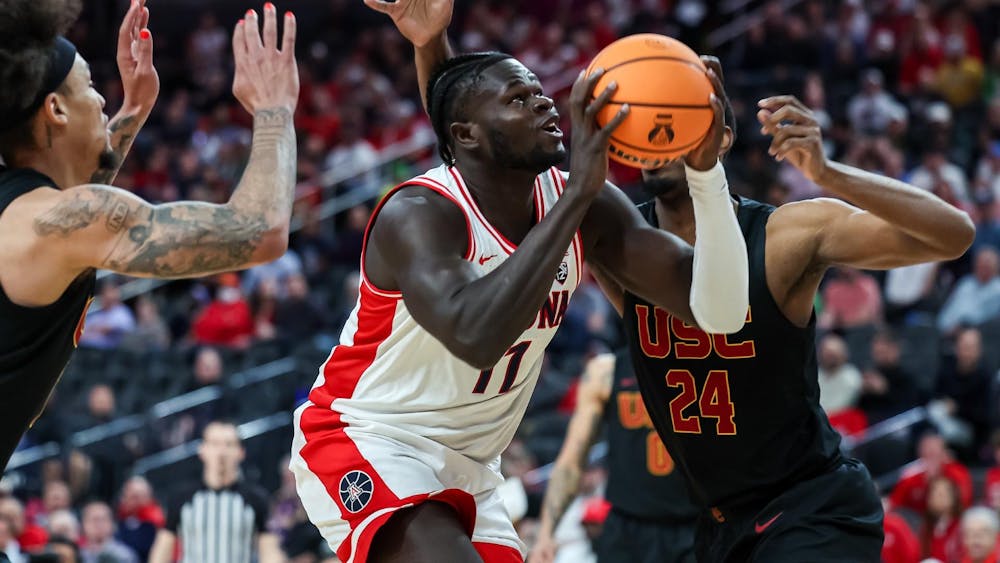Junior Laura Fonseca sat waiting for the bus to the supplemental school where she was teaching on Manguinhos, a city on the island of Itaparica off Salvador, Brazil. She ended up with a long wait, as the bus never showed up and didn't for the rest of the week. \nShe found out eventually that not only had funding been cut from the program, but there wasn't even enough money to put gas in a car to tell Fonseca they were not coming. It was a low point of her trip, but the incredible stories of loving, positive interactions made her journey one worth sharing, and she's dedicated to helping others follow their own dreams.\nFonseca and junior Gail Robertson, along with two others, sold bracelets door-to-door, earning more than $3,000 to fund their month-long trip to Brazil. The money paid for four students' plane tickets and their stay as they worked to teach English and help out in after-school activities to keep kids off the streets and involved in productive activities. Now they want to make that dream possible for other IU students. \nWhile it is typical for students to take mission trips and go on social service programs, these four students funded their own trips and are planning a two-month trip for 15 people next year. \nThey are part of the campus group called Gust, a program Fonseca developed last semester to help students go to places that are dubbed "unsafe" by helping them acquire contacts and raise funds.\nFonseca is president of the organization, which has meetings at 7:30 p.m. the first and third Wednesdays of every month in Ballantine 139. \nThe trip was made possible with help from assistant instructor Phillip Wagner, founder of Rhythm of Hope, a social outreach program in Brazil, said Fonseca. She said Wagner has lots of contacts in the region and is knowledgeable about the area. \nRhythm of Hope is a program that makes connections for people who want to volunteer, sponsor a program or publicize needs or programs, according to its Web site. They take existing programs and help volunteers assist in those programs and make connections. \nWagner said the trip the IU students went on is "a perfect example of how Rhythm of Hope can help people who want to make a difference and get involved." \nWhen the IU students got to the island, they found that literacy was so low they ended up teaching native students Portuguese -- the Brazilians' own language -- instead of strictly English, which they had planned on. The IU students instructed 12- to 26-year-old women Monday through Thursday and helped out at a day care on Fridays. \nThough the island lacked the convenience of everyday life, Fonseca said there was music everywhere, with children singing, dancing and playing. She said the adults fish when they're hungry and live hand-to-mouth. \n"They're happy to be alive," she said. "The adults are more energetic, much calmer and have less worries about day-to-day life."\nRobertson and Fonseca did notice many troubling aspects of life on the island. Fonseca said there was a large population of uneducated children because most of them are only in class two hours a day and have too much free time to get into trouble.\nShe said fighting is more prevalent in the city of Salvador, but Wagner and Fonseca insist they feel comfortable there and that it is safe to travel. \n"Right outside our house, a 10-year-old had another child in a headlock and was threatening him with a rusty pair of scissors," Fonseca said.\nShe said she was able to stop the attack just in time, but there is a lot of violence they can't stop. By being there and keeping the kids entertained, the community is strengthened, she said. Though there was a lot of violence, Robertson said she never once felt unsafe.\nBoth Fonseca and Robertson said the older their students were, the more receptive they were to teaching. They videotaped the experience and said they plan on making a tape of what they are doing.\nFonseca speaks fluent Portuguese and Spanish, but Robertson was new to the language. She said she speaks German and English but understood enough Portuguese to get by, using sign language to communicate.\n"We taught them to sing 'Ice Ice Baby,' play cards and (do) the limbo," Robertson said. "They're amazing at soccer."\nFonseca and Wagner had booths side by side yesterday at the Student Involvement Fair, where they handed out brochures to encourage more participants to get involved and make their social consciousness a reality.\n"If you get in the mind-set, any trip can happen," Robertson said. "It's just a matter of making contacts and working hard"
Students plan return to Brazil for mission trip
Get stories like this in your inbox
Subscribe





